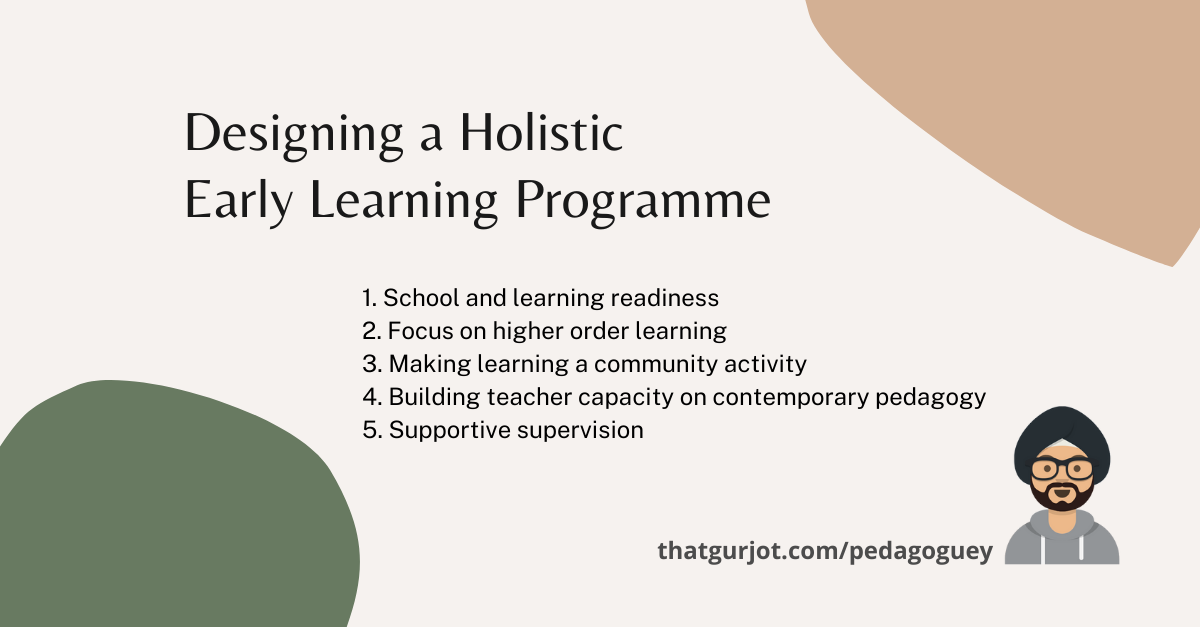Designing a Holistic Early Learning Programme

Learning in the early years has always been of great importance. However, in recent years it has gained limelight owing to the Padhe Bharat Badhe Bharat programme launched under the Sarva Shiksha Abhyan in 2016, followed by the National Education Policy in 2020.
Research shows that the greatest part of brain development occurs before the age of 8. And if a child falls behind the average before Class 3, that gap is highly likely to only widen in each subsequent grade. Thus, designing and implementing a high-quality Early Learning Programme (ELP) is of paramount importance.
Some of its important components should be –
-
School and learning readiness: Often ELP are limited to gaining proficiency in language and arithmetic. However, at an early age it is important to instill the habit and the desire of learning in the child. This can be done by developing an exciting and inviting learning atmosphere. The school should feel like a safe space to the child and she should be able to freely express herself in it. Relatedly, the school is a social space and learning is a social activity. Thus, it is important to build communication skills and peer relationships at this age. Once these essential skills are forged, the child would find acquiring subject matter knowledge very easy and desirable.
-
Focus on higher order learning: The learning targets set for children in early grades need to be ambitious yet achievable. Instead of focusing on reading a certain number of words per minute or counting till two digits, the targets should be related to life skills.
For example, for language, the targets could be – “the child is able to comfortably narrate her lived experience” and “the child is able to read an age-appropriate passage and communicate her thoughts about it”.
Similarly, for mathematics, a target could be – “the child is able to strip a situation down into its constituent elements” and “the child can talk about a situation in a rational, dispassionate manner”.
Objectives like this subsume lower order ones like adding two single-digit numbers or reading three-letter words. It is important to highlight here that the ability to perform arithmetic operations and such can always be picked up at a later stage, however, the desire for learning once lost is nearly impossible to regain. -
Making learning a community activity: Children learn better in a social setting as it builds essential memories. Thus, a good ELP should try to involve the community through reading programmes, storytelling events etc. The love for reading is built best through a personal connection with reading. Thus, within homes, if parents or another elder frequently reads to the child, she will grow up with fond memories of reading and would be more likely to enjoy reading.
-
Building teacher capacity on contemporary pedagogy: Teachers are the lynchpin for successful learning. They should be equipped with all the techniques of constructivist pedagogy so that they are able to create a learning atmosphere that is excites and involves all learners. Through teacher capacity building programmes, a uniform approach towards early literacy (whether phonetic or whole word or mixed) can be shared with all the essential caveats of the importance of contextualization.
-
Supportive supervision: Teachers, schools and systems need support for effective and efficient functioning. This is where a supervisory cadre of academic mentors plays a critical role. These supervisors can act as an academic resource group for the system and provide support in teacher training, material development and outreach activities. At the same time, they can also perform the role of monitoring through school visits and provide on-site support.
Note: I wrote this for work a little while ago. Thought I’d share it with the world.
Gratitude to Subir Shukla and IgnusERG for mentoring my pedagogical understanding!